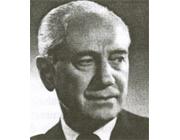
His father, Constantin Rusu, was a priest. His mother, Ema (née Turi), was exclusively in charge of raising and educating the child. He attended the first three primary classes in his native town, continuing, between 1912-1920, the courses of the German Evangelical High School in Bistrita. He enrolled in the Faculty of Law at the University of Cluj, but after his first year, in 1921, he abandoned this specialization in favour of the Faculty of Letters. He completed his higher education in 1925, starting his university career as a student. Due to the fact that literature and philology were not his only passions, he worked during his studies (1923-1925) at the Institute of Psychology in Cluj, being an assistant to Professor Florin Ştefănescu Goangă. This was one of the reasons why Liviu Rusu decided to turn to psychology in his doctoral studies, so that in 1928 he supported his thesis entitled Selection of Gifted Children. Animated by a strong desire for knowledge and documentation, he decided in the same year to continue his specialization in Leipzig, Berlin and Hamburg. In 1929 he returned to the country, serving as an assistant in the Faculty of Letters and Philosophy in Cluj. Two years later he obtained the title of docent in psychology, with the thesis entitled Technical Aptitude and Practical Intelligence. He held the position until 1938, when he became a university professor. The years of specialization in Paris (1933-1935) meant for Liviu Rusu a turning point towards aesthetic studies, taking his doctorate at the Sorbonne, under the leadership of the famous Charles Lalo. The main thesis was published the same year in the famous Bibliothèque collection of Philosophy, becoming a work of international notoriety.
In 1948, however, like other Cluj academics, he was forced by the communist authorities to leave the education system. Sharing the same fate with the poet Lucian Blaga, he managed to find a place as a librarian and later as a researcher in the Cluj Branch Library of the Romanian Academy. In 1961 he was allowed to return to university education as a professor of universal and comparative literature.
His debut in publishing dates back to 1923 in the University World. Over the years he has collaborated on numerous other magazines of the time: The Contemporary, The Society of Tomorrow, New Country, Ethos (Paris), Luceafarul, Nation, Philosophy Magazine, Psychology Magazine, Free Romania, Steaua, Tribuna, Romanian Life etc.
Liviu Rusu is the author of fundamental works, both in the field of psychology, such as the Basic Principles of Applied Psychology or the Problem of Professional Orientation, as well as in the field of aesthetics, such as: The Aesthetics of Lyric Poetry (1937), The Logic of Beauty (1946), the Vision of the World in Our Poetry.. From resignation to creative action (1967), From Eminescu to Lucian Blaga and other literary and aesthetic studies (1981). He died in 1985.


